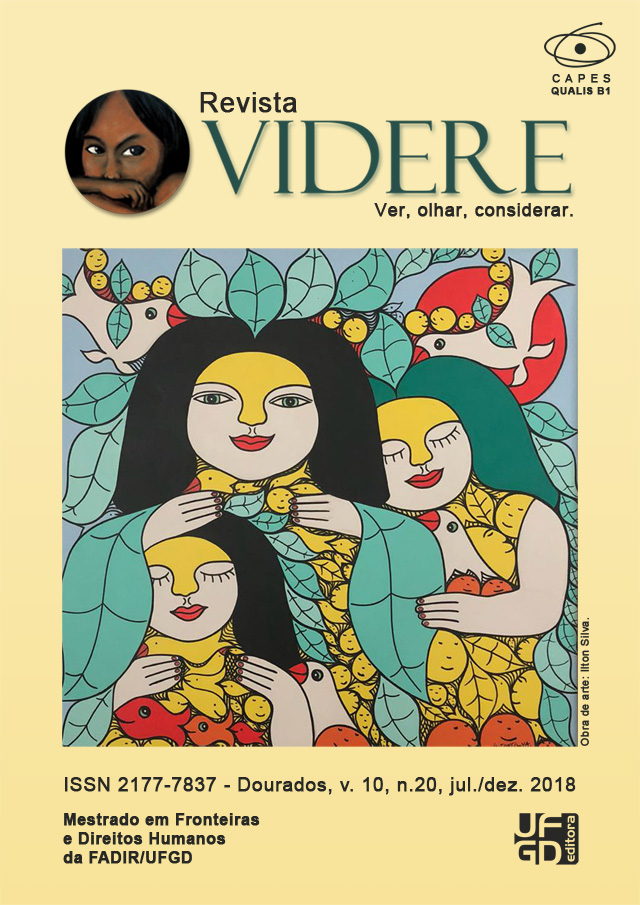Crenças, religiões e Estado de Direito
DOI:
https://doi.org/10.30612/videre.v10i20.9139Keywords:
Direitos culturais. Liberdade religiosa. Proteção jurídica.Abstract
Este trabalho é um estudo sobre a religião, o direito fundamental de liberdade religiosa e sua percepção como direito cultural. Através de uma pesquisa bibliográfica e jurisprudencial, numa perspectiva interdisciplinar, verificamos que no Estado Democrático de Direito a religião deve conviver com a igualdade, dignidade da pessoa humana, justiça social e pluralismo intercultural. E se a religião também é fruto da cultura, a sua proteção deve ser feita nos mesmos moldes da proteção aos direitos culturais.
Downloads
References
BRASIL. Constituição Federal (1988). Constituição da República Federativa do Brasil: promulgada em 5 de outubro de 1988. São Paulo: Atlas, 2018.
CADDELL, Richard; ESTERLING, Shea. The Cultural Rights Imperative, 42 Cambrian L. Rev. 7, 2011.
COSTA, Sebastião P. Mendes da. Conhecimentos tradicionais: direito à proteção e proteção aos direitos. Teses de doutorado. Programa de Pós-Graduação em Direito. PUCRS, Porto Alegre-RS, 2017.
________. Pertencimento, memória coletiva e territorialidade em uma comunidade rural do Piauí. Dissertação de Mestrado. Programa de Pós-Graduação em Antropologia e Arqueologia. Universidade Federal do Piauí, Teresina-PI, 2011.
DURKHEIM, Emile. As formas elementares da vida religiosa. São Paulo: Martins Fonte, 2000.
EVANS-PRITCHARD, E. E. Nuer Religion. London: Oxford Press, 1956.
FARIA, Edilsom. Estado e religião: uma separação de interesse público. Diplomatique. 09 de set. 2009. Retirado do site: http://www.diplomatique.org.br/artigo.php?id=545
GADAMER, Hans-Georg. Verdade e Método. Petrópolis: Vozes, 1998.
GEERTZ, Clifford. A interpretação das culturas. Rio de Janeiro: LTC, 1989.
GORNIG, Gilbert; TRUE, Christiane. Minority Protections in Germany. 6 Tilburg Foreign Law Review 69, 1997.
LARAIA, Roque. Cultura: um conceito antropológico. 12. ed. Rio de Janeiro: Zahar, 1999.
LEITE, Fábio Carvalho. Estado e religião: A liberdade religiosa no Brasil. Curitiba: Juruá, 2014.
MELLO FILHO, José Celso. Constituição Federal Anotada. 2. ed. São Paulo: Saraiva, 1986. p. 440.
MOLINARO, Carlos Alberto. Comentário ao arts. 215 e 216. In: CANOTILHO, J. J. Gomes; MENDES, Gilmar; SARLET, Ingo; STRECK, Lenio. (Coords.) Comentários a Constituição do Brasil. São Paulo: Saraiva/Almedina, 2013. p. 1976-1985.
MORGAN, Lewis H. A sociedade primitiva. Lisboa: Presença, 1973.
O’BRIEN, Sharon. Cultural Rights in the United States: A Conflict of Values, 5 Law and Inequality. 267, 1987.
ROBBERS, Gerhard. Religious Freedom in Germany. Brigham Young University Law Review 643, 2001.
SARLET, Ingo Wolfgang. A eficácia dos direitos fundamentais: uma teoria geral dos direitos fundamentais na perspectiva constitucional. 12. ed. rev. atual. Porto Alegre: Livraria do Advogado, 2015.
SWANSON, Reedy C. Decentering or Decentralizing: Economic, Social, & Cultural Rights in Federal Systems, 57 Virginia Journal of International Law. 129, 2017.
THE EUROPEAN COURT OF HUMAN RIGHTS. Case S.A.S vs France. Strasbourg, 01.07.2014 Decisão disponível em: https://hudoc.echr.coe.int/eng#{%22appno%22:[%2243835/11%22],%22itemid%22:[%22001-145466%22]} Acesso em: 28.06.2018.
TYLOR, Edwar B. Primitive Culture: researches into the development of mythology, philosophy, religion, art, and custom. London: John Murray, 1871.
WEBER, Max. Economia e Sociedade. vol. 1. Brasília: EdUnB, 1996.
WEINGARTNER NETO, Jayme. Comentário ao art. 5º, VI a VIII. In: CANOTILHO, J. J. Gomes; MENDES, Gilmar; SARLET, Ingo; STRECK, Lenio. (Coords.) Comentários a Constituição do Brasil. São Paulo: Saraiva/Almedina, 2013. p. 264-273.
________. Liberdade religiosa na Constituição: fundamentalismo, pluralismo, crenças, cultos. Porto Alegre: Livraria do Advogado: 2007.
Downloads
Published
How to Cite
Issue
Section
License
Authors must accept the publication rules when submitting the journal, as well as agree to the following terms:
(a) The Editorial Board reserves the right to make changes to the Portuguese language in the originals to maintain the cultured standard of the language, while respecting the style of the authors.
(b) Authors retain the copyright and grant the journal the right to first publication, with the work simultaneously licensed under the Attribution-NonCommercial-ShareAlike 3.0 Brazil (CC BY-NC-SA 3.0 BR) that allows: Share - copy and redistribute the material in any medium or format and Adapt - remix, transform, and create from the material. CC BY-NC-SA 3.0 BR considers the following terms:
- Attribution - You must give the appropriate credit, provide a link to the license and indicate whether changes have been made. You must do so under any reasonable circumstances, but in no way that would suggest that the licensor supports you or your use.
- NonCommercial - You may not use the material for commercial purposes.
- Sharing - If you remix, transform, or create from material, you must distribute your contributions under the same license as the original.
- No additional restrictions - You may not apply legal terms or technological measures that legally restrict others from doing anything that the license permits.
(c) After publication, authors are allowed and encouraged to publish and distribute their work online - in institutional repositories, personal page, social network or other scientific dissemination sites, as long as the publication is not for commercial purposes.



















